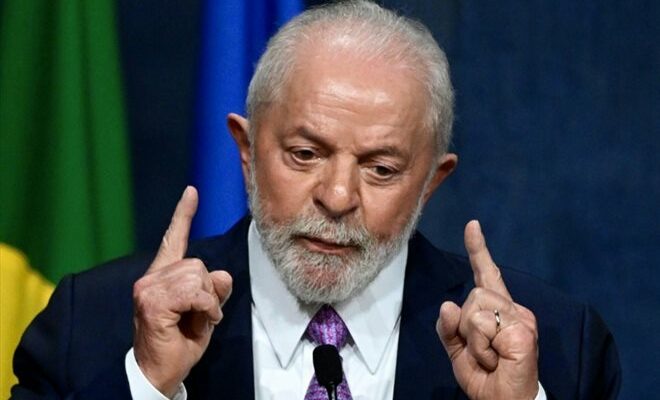Brazilian President Luiz Inacio Lula da Silva during a press conference in Brasilia on December 18, 2023 (AFP/Archives/EVARISTO SA)
Brazilian President Lula is championing the fight against global warming thanks to a sharp reduction in deforestation in the Amazon, but oil production continues to increase in Latin America’s largest country.
A paradox pointed out by environmental defenders, while the international community agreed at COP28 in December to call for the gradual abandonment of fossil fuels, the main cause of greenhouse gas emissions. Greenhouse.
Not to mention that in the middle of this UN climate conference in Dubai, Brazil announced its entry into the expanded alliance of the Organization of the Petroleum Exporting Countries (OPEC+).
This earned him the unenviable “fossil of the day” award from the NGO Climate Action Network (CAN), for having “conflated oil production with climate leadership”.
“Brazil cannot be a climate leader and an oil state, it is incompatible,” insists Suely Araujo, of the Brazilian Climate Observatory collective, to AFP.
– Production records –
Returning to power just over a year ago, left-wing President Luiz Inacio Lula da Silva pledged to eradicate illegal deforestation in Brazil by 2030, which had soared under his far-right predecessor Jair Bolsonaro.
During the first year of Lula’s third term, the deforested area in the Amazon was reduced by half.
Brazil has also offered to host the COP30 in 2025, in a highly symbolic location, Belem, a city which is one of the gateways to the largest tropical forest on the planet.
But that hasn’t stopped the world’s ninth-largest oil producer from stepping on the accelerator, breaking numerous monthly crude production records last year.
The last one dates from November, when nearly 3.7 million barrels per day were extracted.
The government is targeting 5.4 million barrels per day by 2029, hoping to see the country rise to fourth place in the world in five years.
“The world should thank Brazil for being a reliable supplier” of oil, said the director of the International Energy Agency, Fatih Birol, on Wednesday during a visit to Brasilia.
According to him, Brazilian production represents 3% of world supply.
This continental-sized country has proven reserves of 14.856 billion barrels, according to the latest annual bulletin from the National Petroleum Agency (ANP).
Most of these reserves are found in pre-salt deposits, located in very deep waters in the Atlantic.
Lula is in favor of a controversial exploration project by the public oil company Petrobras near the mouth of the Amazon, to the great dismay of his emblematic Minister of the Environment, Marina Silva.
– Energetic transition –
The oil industry represents “around 13% of the GDP” of the largest Latin American economy, according to Igor Barenboim, former deputy secretary for economic policy at the Ministry of Finance (2015-2016).
About a third of production is intended for export, which generates “fundamental income for the growth” of the country, he says.
The oil windfall also allows the State to mitigate the impact of social spending on the budget balance.
During his first two mandates (2003-2010), Lula financed ambitious programs to fight poverty thanks to the boom in raw materials.
The Brazilian president now considers that oil wealth is necessary to invest in the energy transition, particularly renewable fuels, such as green hydrogen.
But it is far from convincing environmental defenders.
“It is a mistake to want to obtain income through oil exports, looking to the past, without taking into account the climate crisis,” criticizes Suely Araujo.
Enrico Marone, of the Brazilian branch of Greenpeace, is particularly opposed to new exploration projects, affirming that the deposits currently exploited “can generate sufficient income to support the energy transition”.
Nearly half of Brazil’s energy (47.4%) is renewable, more than triple the global average (15%), according to government figures.
© 2024 AFP
Did you like this article ? Share it with your friends using the buttons below.




